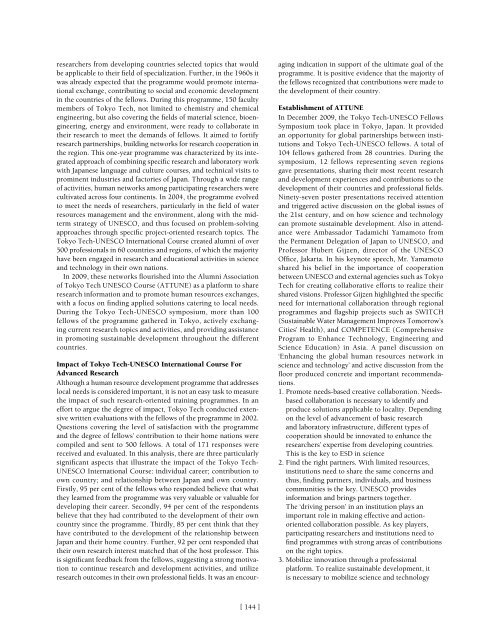Tomorrow today; 2010 - unesdoc - Unesco
Tomorrow today; 2010 - unesdoc - Unesco
Tomorrow today; 2010 - unesdoc - Unesco
Create successful ePaper yourself
Turn your PDF publications into a flip-book with our unique Google optimized e-Paper software.
esearchers from developing countries selected topics that wouldbe applicable to their field of specialization. Further, in the 1960s itwas already expected that the programme would promote internationalexchange, contributing to social and economic developmentin the countries of the fellows. During this programme, 150 facultymembers of Tokyo Tech, not limited to chemistry and chemicalengineering, but also covering the fields of material science, bioengineering,energy and environment, were ready to collaborate intheir research to meet the demands of fellows. It aimed to fortifyresearch partnerships, building networks for research cooperation inthe region. This one-year programme was characterized by its integratedapproach of combining specific research and laboratory workwith Japanese language and culture courses, and technical visits toprominent industries and factories of Japan. Through a wide rangeof activities, human networks among participating researchers werecultivated across four continents. In 2004, the programme evolvedto meet the needs of researchers, particularly in the field of waterresources management and the environment, along with the midtermstrategy of UNESCO, and thus focused on problem-solvingapproaches through specific project-oriented research topics. TheTokyo Tech-UNESCO International Course created alumni of over500 professionals in 60 countries and regions, of which the majorityhave been engaged in research and educational activities in scienceand technology in their own nations.In 2009, these networks flourished into the Alumni Associationof Tokyo Tech UNESCO Course (ATTUNE) as a platform to shareresearch information and to promote human resources exchanges,with a focus on finding applied solutions catering to local needs.During the Tokyo Tech-UNESCO symposium, more than 100fellows of the programme gathered in Tokyo, actively exchangingcurrent research topics and activities, and providing assistancein promoting sustainable development throughout the differentcountries.Impact of Tokyo Tech-UNESCO International Course ForAdvanced ResearchAlthough a human resource development programme that addresseslocal needs is considered important, it is not an easy task to measurethe impact of such research-oriented training programmes. In aneffort to argue the degree of impact, Tokyo Tech conducted extensivewritten evaluations with the fellows of the programme in 2002.Questions covering the level of satisfaction with the programmeand the degree of fellows’ contribution to their home nations werecompiled and sent to 500 fellows. A total of 171 responses werereceived and evaluated. In this analysis, there are three particularlysignificant aspects that illustrate the impact of the Tokyo Tech-UNESCO International Course: individual career; contribution toown country; and relationship between Japan and own country.Firstly, 95 per cent of the fellows who responded believe that whatthey learned from the programme was very valuable or valuable fordeveloping their career. Secondly, 94 per cent of the respondentsbelieve that they had contributed to the development of their owncountry since the programme. Thirdly, 85 per cent think that theyhave contributed to the development of the relationship betweenJapan and their home country. Further, 92 per cent responded thattheir own research interest matched that of the host professor. Thisis significant feedback from the fellows, suggesting a strong motivationto continue research and development activities, and utilizeresearch outcomes in their own professional fields. It was an encour-aging indication in support of the ultimate goal of theprogramme. It is positive evidence that the majority ofthe fellows recognized that contributions were made tothe development of their country.Establishment of ATTUNEIn December 2009, the Tokyo Tech-UNESCO FellowsSymposium took place in Tokyo, Japan. It providedan opportunity for global partnerships between institutionsand Tokyo Tech-UNESCO fellows. A total of104 fellows gathered from 28 countries. During thesymposium, 12 fellows representing seven regionsgave presentations, sharing their most recent researchand development experiences and contributions to thedevelopment of their countries and professional fields.Ninety-seven poster presentations received attentionand triggered active discussion on the global issues ofthe 21st century, and on how science and technologycan promote sustainable development. Also in attendancewere Ambassador Tadamichi Yamamoto fromthe Permanent Delegation of Japan to UNESCO, andProfessor Hubert Gijzen, director of the UNESCOOffice, Jakarta. In his keynote speech, Mr. Yamamotoshared his belief in the importance of cooperationbetween UNESCO and external agencies such as TokyoTech for creating collaborative efforts to realize theirshared visions. Professor Gijzen highlighted the specificneed for international collaboration through regionalprogrammes and flagship projects such as SWITCH(Sustainable Water Management Improves <strong>Tomorrow</strong>’sCities’ Health), and COMPETENCE (ComprehensiveProgram to Enhance Technology, Engineering andScience Education) in Asia. A panel discussion on‘Enhancing the global human resources network inscience and technology’ and active discussion from thefloor produced concrete and important recommendations.1. Promote needs-based creative collaboration. Needsbasedcollaboration is necessary to identify andproduce solutions applicable to locality. Dependingon the level of advancement of basic researchand laboratory infrastructure, different types ofcooperation should be innovated to enhance theresearchers’ expertise from developing countries.This is the key to ESD in science2. Find the right partners. With limited resources,institutions need to share the same concerns andthus, finding partners, individuals, and businesscommunities is the key. UNESCO providesinformation and brings partners together.The ‘driving person’ in an institution plays animportant role in making effective and actionorientedcollaboration possible. As key players,participating researchers and institutions need tofind programmes with strong areas of contributionson the right topics.3. Mobilize innovation through a professionalplatform. To realize sustainable development, itis necessary to mobilize science and technology[ 144 ]

















